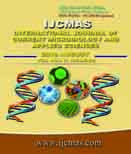


 National Academy of Agricultural Sciences (NAAS)
National Academy of Agricultural Sciences (NAAS)

|
PRINT ISSN : 2319-7692
Online ISSN : 2319-7706 Issues : 12 per year Publisher : Excellent Publishers Email : editorijcmas@gmail.com / submit@ijcmas.com Editor-in-chief: Dr.M.Prakash Index Copernicus ICV 2018: 95.39 NAAS RATING 2020: 5.38 |
Milk production of India has increased significantly that it outspaced the global milk production. 7.0 percent milk produced is converted to fermented dairy products. In our present study, we prepared herbal Lassi enriched with honey and Tulsi extract. Honey is an important and unique food product containing bioactive compounds derived from bees and plants. Bioactive components in honey which confers health benefits includes a number of flavonoids, phenolic acids, ascorbic acid, tocopherols, alkaloids, number of aromatic acids and carotenoids. Ocimum sanctum popularly known as ‘Tulsi’ in Hindi and ‘Holy basil’ in English is one of the sacred herb for Hindu in Indian subcontinent. It has versatile role to play in traditional medicine. The combination of 2.0 percent Tulsi extract and 10.0 percent honey was considered to be the most appropriate level for manufacturing of herbal honey Lassi. During storage studies average lactobacilli count, streptococci count, yeast and mold count was found 9.06 log CFU/g, 8.27 log CFU/g and 2.18 log CFU/g respectively for herbal Lassi. Coliform count was found absent during entire storage period.
 |
 |
 |
 |
 |